President Jovenel Moise did not order the arrest of former opposition Senator Nenel Cassy last week, Haiti's ambassador to the U.S., Bocchit Edmond, says.
"To make it clear, there is no truth in that. President Moise did not order the arrest of Mr. Cassy," Edmond told VOA in an exclusive interview. "The arrest was made onsite at the rally. The rally turned violent. The national police had to step in."
But Cassy offered a different version of the events in a conversation with reporters after his release from a Miragoane jail on Jan. 22.
Cassy, who represented former President Jean Bertrand Aristide's Lavalas party in parliament and is a native of the region, says he traveled to Miragoane, a coastal town in Haiti's western department on Jan. 21 to seek the release of political activists who had been arrested during an anti-government protest earlier in the day. They were charged with committing "flagrant delinquent acts" but were released with Cassy, hours after being detained.
"The attorney general arrived at the police station where lawyer Andre (Michel) and I were talking to the departmental director. Two policemen were present, and Andre was asking them to release the activists. When he (Jean Ernest Muscadin, the attorney general for Miragoane) arrived, he said, 'We're going to arrest the senator.' He said, ‘The president of the republic has asked me to arrest Senator Cassy.’ When I asked him, ‘Which president? Jovenel?’ He responded, ‘Yes, Jovenel said I must arrest you today,’" Cassy said.
The former senator said when he asked Muscadin what he was to be charged with, he was told, "This is an order from the president."
"He (the attorney general) told me tremendous pressure had been exerted by the president to make the arrest and he (Moise) threatened to fire him if he didn't do it," Cassy said. "‘If I went against the order, I'd have to flee the country,’ he told me.”
Cassy said the attorney general then handcuffed him.
Muscadin, during an interview on a Haitian radio show, confirmed that Moise had asked him to arrest Cassy.
Ambassador Edmond offered a different version of events:
"According to the police report, (former) Senator Cassy was apparently trying to stop police arrests of some of those who were participating in the event. I believe he went to the police precinct trying to get his people (out). I believe it is something that happened on the site (police station). But President Moise was not aware of that," he told VOA.
"President Moise has no interest in giving orders to arrest the former senator," the ambassador added. "That is not going to serve any good for what we want to do."
Pressed on whether President Moise had any involvement whatsoever in the arrest or release of Cassy, Edmond noted that the administration respects the separation of powers.
"I don't think he (President Moise) intends to get involved in any judiciary process because the executive and the judiciary are two separate branches of the government. Therefore, he cannot call to ask for a release and so on. There is a minister for justice, and it is his role to deal with them. But the president is not going to (get) involved in issues like that," the ambassador told VOA.
Moise has not commented on the arrest. But in a Jan. 18 speech, Moise warned his political opponents that the country's new intelligence agency was keeping watch and that any "vagabonds" found to be handing out money to encourage people to protest would face consequences.
News of Cassy's arrest was placed on social media and went viral, sparking outrage from Haitians and the diaspora. VOA Creole reporters said they saw tires burning on some streets of the capital and that makeshift barricades were erected, including in front of the police station where Cassy was being held.
The former senator's arrest also unified opposition politicians, who tend to disagree on most topics. They rallied to support their colleague, called on Moise to rescind the arrest order and demanded an investigation.
This week, the opposition announced a series of nationwide protests between Jan. 28 and Feb. 7 to demand the president resign.





